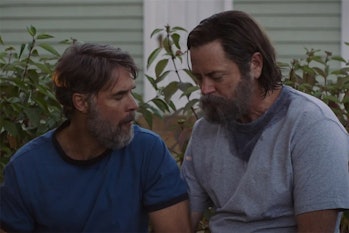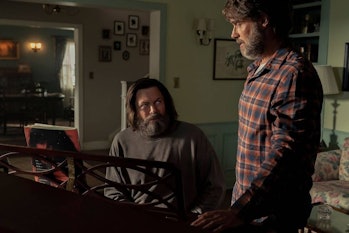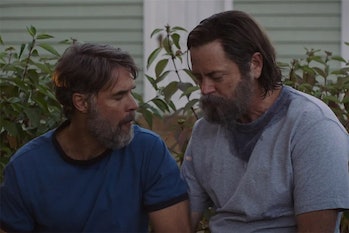When queer characters appear onscreen, the most cynical viewer can set their timer to when they inevitably die.
From books like The Big Sleep to TV shows like The 100, there’s a harmful tendency for queer characters to die, sometimes in gruesome ways. While recent pop culture has used the death of LGBTQ+ characters to foster sympathy, it has more malicious history. “Bury your gays,” as it is called, is rooted in widespread homophobia in the late 19th century, and was furthered by the advent of Hollywood’s Puritanical Hays Code. Sadly, it can still be seen on a handful of TV shows today.
The shorthand implication of burying your gays is that queer love is a death sentence. But in HBO’s The Last of Us, two men who fall in love in the apocalypse, actually get to live their lives, and for once, choose to go out on their own terms.
While the latest episode, “Long, Long Time” indeed ends on a heartbreaking note, the show should be recognized as a subversion of a harmful, centuries-old trope. It’s defended as much by co-creator Craig Mazin, who insists The Last of Us isn’t keeping up stale stereotypes, but mining further depth out of heavy stories about sacrifice, togetherness, and yes, love.
Spoilers for The Last of Us Episode 3 ahead.

In “Long, Long Time,” the acclaimed third episode of The Last of Us, Nick Offerman guest stars as “Bill,” a hardened survivalist who was more than prepared for the world to collapse. A few years into Bill’s isolation, he meets Frank (Murray Bartlett), a stranger who wanders into Bill’s traps but successfully infiltrates his way into Frank’s steely heart.
The original video game makes mention of Frank committing suicide after a falling-out with Bill. But the HBO show deepens Bill and Frank’s relationship to reveal just how these two polar opposites came together. The episode dedicates special time to this too; Frank and Bill’s relationship spans over 15 years. In the end, Frank, suffering from an unnamed illness of muscular degeneration, asks to be killed, but not before spending one last happy day with Bill. Bill obliges by crushing enough pills “to kill a horse” into their evening wine. But Bill pours a glass for himself, willfully choosing to go out with his lover.
“This isn’t the tragic suicide at the end of the play,” Bill says to Frank. “I’m old. I’m satisfied. And you were my purpose.”
In the official series podcast, hosted by actor Troy Baker (who starred as “Joel” in the video game), Craig Mazin says the line, lifted from playwright Mark Crowley, was to acknowledge the harmful “bury your gays” trope. As Mazin described to Baker in the podcast:
“There is a tradition, of essentially equating homosexuality with tragedy. And that a gay man couldn’t possibly just age and be happy and live long. And it was important for me to have Bill literally say, that’s not what this is.”

Mazin and Neil Druckmann (co-director of the game and co-showrunner on the series) both add that Bill and Frank have reached the end, and that even for the comparatively more healthy Bill, there isn’t much life left. Their willingness to go out on terms they’ve decided for themselves is what gives their story the power it has.
Unlike other stories where queer characters die young, The Last of Us is a sunset portrait of two aging men who have enjoyed a full life together. While the episode still ends in their deaths — and, as Mazin says on the podcast, as a means to propel the hetero lead character Joel, played by Pedro Pascal, to take watch over Ellie — it still allows viewers to take in their life. The good parts, the bad, and the beautiful.
The Last of Us airs Sunday nights on HBO.







